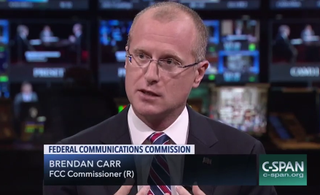FCC's Carr: Internet Won't End June 12

Republican FCC Commissioner Brendan Carr signaled this week he thought reports of the impending death of the internet were highly overrated.
In an interview for C-SPAN's Communicators series, Carr said that on June 11, when the FCC's network neutrality regulation rollback takes effect, consumers "are not going to see the end of the internet" and "in fact, are going back to the same regime we had in 2015 and for 20 years before that."
He said it was a return to a "tried and true" framework. Asked if the FCC "washes its hands" of net neutrality and deeds it to the FTC, Carr said no, pointing to the transparency rule, which requires broadband providers tell the FCC how they are managing the network, then the FTC can identify any consumer harm.
Related: Network Neutrality Rollback Effective June 11
Championing the argument of ISPs against the former Title II-based, bright-line rules--that they discouraged network buildouts--Carr said he thought that the only difference consumers would notice post-June 11 was increased investment in broadband deployment, which is a key policy goal for Republicans and Democrats.
Carr said that when he gets out of D.C., what he hears is that people want better, faster, cheaper broadband, and more choice.
While there have been lawsuits to block the reg rollback, and the Senate has voted to roll back the rollback using a Congressional Review Act resolution, there is a lot of common ground that has been lost in all the "D.C.-based debate." That common ground is on "no blocking, no discrimination, no broken promises" and that the focus should be on stand-alone legislation that does just that.
Broadcasting & Cable Newsletter
The smarter way to stay on top of broadcasting and cable industry. Sign up below
Republicans have proposed bills that prevent blocking and throttling (the House) and blocking, throttling and paid prioritization (the Senate). But Democrats still want a Title II basis for rules, something Republicans won't accept, and the Democrats who might accept something less than Title II see the bills as still too limiting on the FCC's broadband regulatory authority, or they may not be in a hurry to compromise with Republicans before an election in which they could use net neutrality as an issue to unseat them.
Carr said trying to put Title II back on the internet is the wrong approach. He said while there was room for disagreement over Title II versus Title I and that reasonable minds could disagree, what people outside Washington really want is more competition and choice in broadband.
Carr, who has been given the task by Chairman Ajit Pai of motormanning its wireless infrastructure proceeding, said that the government's historic approach to deployment assumed everything was a "big, macro" tower, rather than the small cells that will be driving 5G. Those small cells can "flip the business case" he said for some areas of the country to build out wireless. The FCC is trying to make it easier to flip by speeding tower siting and permitting.
Carr said he thought the FCC had pretty broad preemption powers over state and local laws that impeded the deployment of advanced communications, adding that it was up to the FCC to interpret congressional guidance in this area to "make sure that they still make sense in light of the modern technological deployments, so this is an area where we do have a significant amount of authority."
Carr said he expected some pushback from states and localities, but also pointed to almost two dozen states that had passed "forward thinking" small cell legislation.
It is important to beat China to 5G, the commissioner said, because it would take $275 billion in capital to build it out, and money flowed to countries with "5G ready" regulatory structures."
Carr agreed that he could see the European Union’s General Data Protection Regulations (GDPR), which go into effect Friday (May 25), being adopted in the U.S., but also that one of the things that rolling back Title II does is return privacy oversight of ISPs to the FTC, which already oversees edge privacy, so that agency can take a "holistic look" at U.S. privacy protections.
Carr would not weigh in on the proposed Sprint-T-Mobile merger in particular, or whether it was in the public interest to go from four to three major wireless carriers.
The Carr interview airs Saturday, May 26, at 6:30 p.m. on C-SPAN and Monday, May 28, at 8 a.m. and 8 p.m. on C-SPAN2.
Contributing editor John Eggerton has been an editor and/or writer on media regulation, legislation and policy for over four decades, including covering the FCC, FTC, Congress, the major media trade associations, and the federal courts. In addition to Multichannel News and Broadcasting + Cable, his work has appeared in Radio World, TV Technology, TV Fax, This Week in Consumer Electronics, Variety and the Encyclopedia Britannica.

